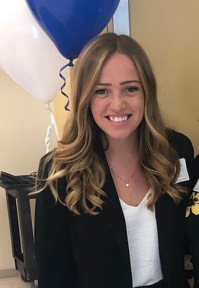“Good” Supervision
Author: Sarah Kamenecka, MHC
AFTER AN 18-MONTH CLINICAL INTERNSHIP IN SPCC’S THERAPEUTIC VISITATION PROGRAM, SARAH RECENTLY GRADUATED FROM UNIVERSITY OF ROCHESTER, WARNER SCHOOL OF EDUCATION, WITH A MASTER’S DEGREE IN MENTAL HEALTH COUNSELING. WE ARE NOW SO PLEASED TO SAY THAT SARAH HAS BEEN HIRED AS AN INFANT AND EARLY CHILDHOOD THERAPIST IN OUR FAMILY TRAUMA INTERVENTION PROGRAM. AS WE OFFICIALLY WELCOME SARAH INTO A FULL-TIME POSITION AT SPCC, WE LOOK BACK WITH HER AS SHE REFLECTS ON HER SUPERVISORY EXPERIENCES DURING HER TIME IN INTERNSHIP.
A VERSION OF THIS ARTICLE WAS ORIGINALLY PUBLISHED IN WARNER SCHOOL OF EDUCATION’S SPRING 2019 CLINICAL SUPERVISOR NEWSLETTER.
It has become clear to me that great mentors are truly very hard to find. When I first started my graduate program at Warner, there was a strong emphasis on receiving “good” supervision and my professors continuously touched on the importance and value of having a “good supervisor”. I was left not being entirely sure 1) what that was and 2) how on earth I was in a place to be able to assess and look out for “good” supervision. However, as a novice counselor entering into a helping profession and internship that works with children and families in immense pain, I could certainly get behind the need for this “good” supervision everyone kept touting.
Looking back, I didn’t fully understand the depth of how important supervision is, nor how incredibly valuable it would be to my professional and personal development. Now a bit wiser and a touch older, I am struck by the parallel between supervision and Infant Mental Health work; in our work, as Infant Mental Health informed providers, we know that infants and young children develop optimally within the context of safe, predictable, attuned, and emotionally available caregivers. What I now know is that as a professional working with and on behalf of infants, young children and their families, I develop optimally within the context of a safe, predictable, attuned, and emotionally available supervisor.
What’s funny, is while I knew that I needed this elusive “good supervision”, once I thought I found it in my internship supervisor at SPCC, I wasn’t entirely sure how to use it. Should I be proving to my supervisor how much I knew? Should I be helping them have confidence in me by subtly and overtly demonstrating my awesomeness? Was I allowed to be the ‘real’ me (which in my less confident moments was realistically some version of, “Who on earth gave me permission to help people?!”) Was it ok to be unsure? To not know the answers? To feel lost, found, hopeless, and hopeful all at the same time?! Slowly but surely I was shown repeatedly, through trial and error, that being ‘me’—fully and completely—was not only allowed but encouraged in this supervisory space.
“Slowly but surely I was shown repeatedly, through trial and error, that being ‘me’—fully and completely—was not only allowed but encouraged in this supervisory space.“
The experience of participating in and receiving Reflective Supervision, the particular type of supervision offered at SPCC, was profoundly transformative in my growth as a clinician and human being. As a master’s student and intern, I learned that therapy isn’t necessarily always just a thing to do but rather, a way to be. Reflective Supervision works similarly as the practice is a way of being, processing and reflecting on personal and professional experiences within the context of a trusting and secure supervisory relationship. I’ve rarely experienced a supervision session where my supervisor provided the answer, gave me advice, or told me what to do next (even when I felt annoyed by that in the moment!). Instead, they exemplified the value of a meaningful and trusting relationship and taught me how that relationship was the key ingredient to my healing, change, and growth. Through the immense power of parallel process, attending to the emotional content and my reactions, gentle guidance, space to explore, space to screw up, and nurturance and support, the light was shed on new perspectives, I was guided toward noticing my emotions, and found answers I already had within myself.
“I was guided toward noticing my emotions, and found answers I already had within myself.“
When I think about what this relational journey has been like for me, the word, “safe” is what first comes to mind. At SPCC I’ve consistently experienced a safe space with a safe and trusting supervisor who accepts who I am and everything I bring to supervision, even the messy stuff. While there have been moments when supervision feels deeply emotional, challenging and sometimes frustrating, these are often the moments where upon reflection I know that change and growth probably most occurred. As I look back on these moments, not only am I able to see the ways in which they’ve aided in my growth as a clinician and overall person but am also incredibly appreciative for the relationship with my supervisor who was able to bear witness to these moments and endorse such healing and growth.
My experiences in participating and receiving Reflective Supervision were invaluable to my growth as a person and clinician. I am implausibly grateful for my internship supervisor at SPCC and who exemplified authenticity, vulnerability, reflection, and introspection, and through this modeling, taught me how these qualities can and do also live in me. As I embark on the next new journey, again at SPCC, these skills and lessons learned will be forever engrained in me and hopefully infused into my clinical work with clients. I can now go into this work knowing, a little more confidently, what this “good” supervision is all about.




